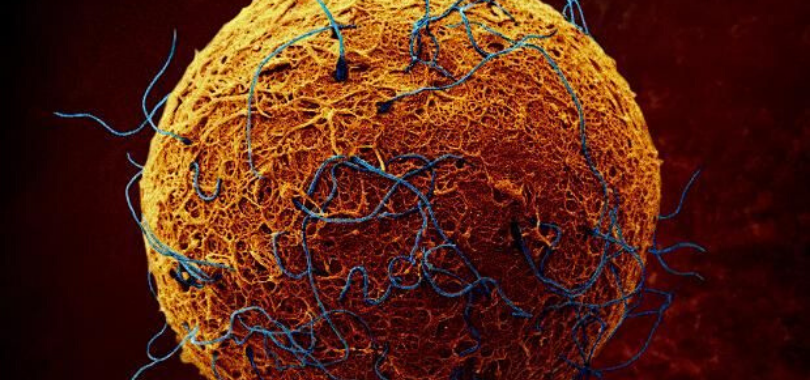Regular sex isn’t just beneficial for ones health, physical and mental well being and happiness. Researchers have now found that regular sex and a protein in seminal fluid actually helps to trigger ovulation in females and make them more fertile to sustain a pregnancy.
Semen isn’t just a vehicle for carrying sperm
Semen isn’t just a vehicle for carrying sperm and studies actual now show that it also plays a crucial role in triggering ovulation. Researchers have discovered the protein in the seminal fluid acts as a hormonal signal on the female brain. This triggers the release of other hormones that signal the ovaries to release an egg.
The international team of researchers at the University of Saskatchewan, found this protein in a variety of mammals and say it plays an important role in reproduction in all mammals.
Male mammals have accessory sex glands that contribute seminal fluid to semen, but the role of this fluid and the glands that produce it are not well understood. From the results of the research, it is now understood that these glands produce large amounts of a protein that has a direct effect on the female brain and reproductive organs.
Ovulation Inducing Factor (OIF)
The protein, which was dubbed the ‘ovulation-inducing factor’ (OIF), works through the hypothalamus of the female brain. This part of the brain links the nervous system to the endocrine system (a system of glands that secrete hormones into the blood stream) via the pituitary gland.
The idea that a substance in mammalian semen has a direct effect on the female brain is not a new one, but now there is research to back these theories up. The scientists also discovered it is the same molecule that regulates the growth, maintenance, and survival of nerve cells.
OIF affects ovulation and fertility
In this study, they also looked at how OIF not only affected ovulation in females, but how it also affected their fertility and chances of a pregnancy.
For the purposes of the study, the research team looked at two species of mammals, that being llamas and cattle. They did this because Llamas are ‘induced ovulators, meaning that they ovulate only when they have been inseminated. Cows and humans on the other hand are ‘spontaneous ovulators,’ meaning that a regular build up of hormones stimulates the release of an egg.
Using a variety of techniques, the researchers found OIF present in semen samples taken from both animals. However, when they injected the llamas with this protein it caused them to ovulate. The same effect wasn’t seen in cattle.
While OIF didn’t appear to induce ovulation in spontaneous ovulators, such as cows and human, it did affect fertility in different ways. The protein was found to effect the timing of when cattle developed follicles (fluid-filled sacs in the ovary which carry the eggs). The researcher also found that OIF promoted the development of a temporary endocrine structure needed to sustain pregnancy.
Research has broaden our understanding of ovulation and fertility
This research definitely helps to broaden our understanding of the mechanisms that regulate ovulation and also helps to raises some interesting insights into fertility. More research is needed to see what role OIF plays in human fertility, as the researchers suspect it will be exactly the same. The study appeared in the Proceedings of the National Academy of Sciences.
It is great to see this research getting out there and this is something that I have promoted and taught for ages. It is great to see actual research to back up what I have teaching for years. Let’s face it, many of our advancements in fertility have actually come from veterinary science through use of IVF in cattle.
Couples undergoing IVF need to be having more sex
This is also great research that showed why couples trying to have a baby, or undergoing fertility treatments (IVF etc) need to still be having sex. It isn’t rocket science, yet so many people forget basic biology and that we are actually still an animal.
The problem is that so many couples actually stop having sex when doing assisted reproduction such as IVF. While I can totally understand the whole emotional aspect of why, it is still hindering their chances of conception and having a successful pregnancy. It is a truth that must be talked about and also get couples to understand.
Regular sex also helps with connection for the couple
I am always telling them how important it is to still have an active sex life, for the benefit of a happy, healthy relationship. It is also about the connection and not just about having sex. We do see so many couples split up while undergoing IVF and assisted reproduction, and some of this is purely due to lack of bonding and connection with their partner.
But even so, regular sex and intercourse also gives the chance of a natural pregnancy too, no matter how slim the chance for some couples. We still see couples that have done multiple cycles of IVF still conceiving naturally, but you actually have to have sex for this to happen.
Now we have research, which shows that a protein in seminal fluid actually acts as a hormonal signal that actually triggers ovulation, improves egg quality and may in fact make a woman more fertile for a pregnancy to take place. Again, when you look at this logically, it really is not rocket science and really is easy to understand.
Regular sex while doing IVF improves pregnancy rates.
This is why it is so important for all our couples using ART (Assisted Reproduction Therapy) and IVF to still keep having sex. Regular sex and more importantly regular climax, increases your sex hormones, helps regulate hormones, increases blood flow to the uterine lining, helps with libido, helps with egg quality, helps for better ovulation and most of all improves your fertility and the chance of sustaining a pregnancy. There is also research to show that regular sex before and after IVF transfer, improves pregnancy rates and I will talk about this research in another article on it’s own.
Final Word
If you are struggling to have a baby, and need help with fertility issues, then talk to my friendly staff about how our fertility program might be able to assist you. It has helped over 12,500 babies into the world… and counting.
Regards
Andrew Orr
-No Stone Left Unturned
-Master of Reproductive Medicine
-Master of Women’s Health Medicine
-The International Fertility Experts





